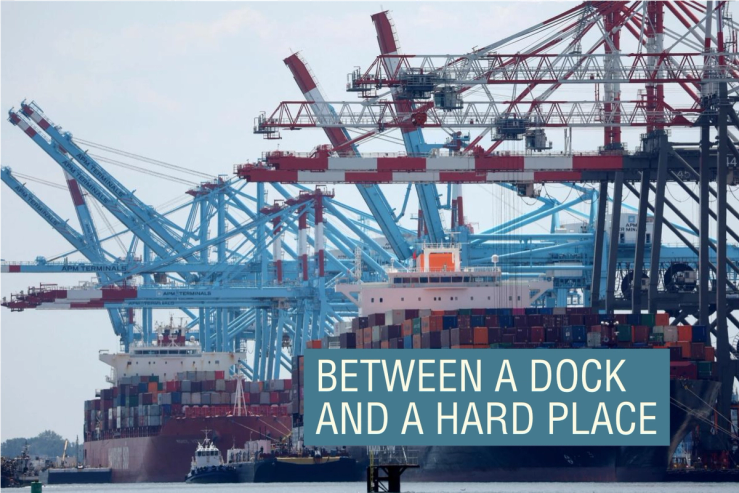The News
US dockworkers on the East and Gulf coasts began striking overnight Tuesday, halting shipments in and out of half of the country’s ports and introducing a new risk to the largest economy in the world.
The large-scale stoppage — the first in nearly 50 years — began after contract talks broke down with the union representing 45,000 port workers. In the New York City area alone, nearly 100,000 containers are waiting to be unloaded, with 35 more container ships on their way.
The White House isn’t panicking yet about supply shocks and is avoiding intervening for now, saying that “impacts on consumers are expected to be limited at this time.” But as the strike continues, the Biden administration could face a dilemma over whether to side with industry or unions if it were to intervene — a decision that could impact the presidential race.
SIGNALS
Just before election, Democrats face dueling economic and union concerns
Retailers and importers hope President Joe Biden steps in to end the strike using the Taft-Hartley Act, which President George W. Bush invoked in 2002 to stop an 11-day shutdown of 29 West Coast ports. But such a move would be “widely despised” by unions, a Rutgers University labor relations expert said, and “Democrats really can’t afford to alienate organized labor.” While Kamala Harris has worked to court union votes, an economic disturbance that raises prices for consumers just before the election could dent her economic pitch. A recent poll conducted by the US Chamber of Commerce found most voters, around 57%, want the government to intervene in a strike, with 20% opposed.
Shutdown could have global ripple effects
Impacts to US shipping are likely to ripple across the globe, especially if the shutdown lasts longer than a week. “These ships will be delayed” returning to East Asia, one analyst wrote. The industry has already been through the wringer this year — from attacks in the Red Sea to the Baltimore bridge collapse to the Panama Canal drought — and the strike “has the magnitude to really throw a giant wrench in global supply chains,” an industrial researcher told CNBC. Vessels may be forced to redirect to the West Coast or Middle East, creating bottlenecks in those areas and raising costs. That could hit Middle Eastern consumers especially hard, since the region relies more on imports, United Arab Emirates’ state-owned The National reported.
Automation debate central to negotiations
In addition to higher pay, the dockworkers union is pushing for a ban on automated cranes, gates, and container-moving trucks, arguing that they would kill jobs. “It is now possible to run a dockyard with almost no humans present,” The Washington Post columnist Heather Long wrote. “People are needed to oversee things, but their role is now more akin to air traffic control.” But “the idea that we should never apply modern technology to port operations when the US is already way behind the state of the art in this regard is absurd,” the economics and politics writer Matthew Yglesias said.



